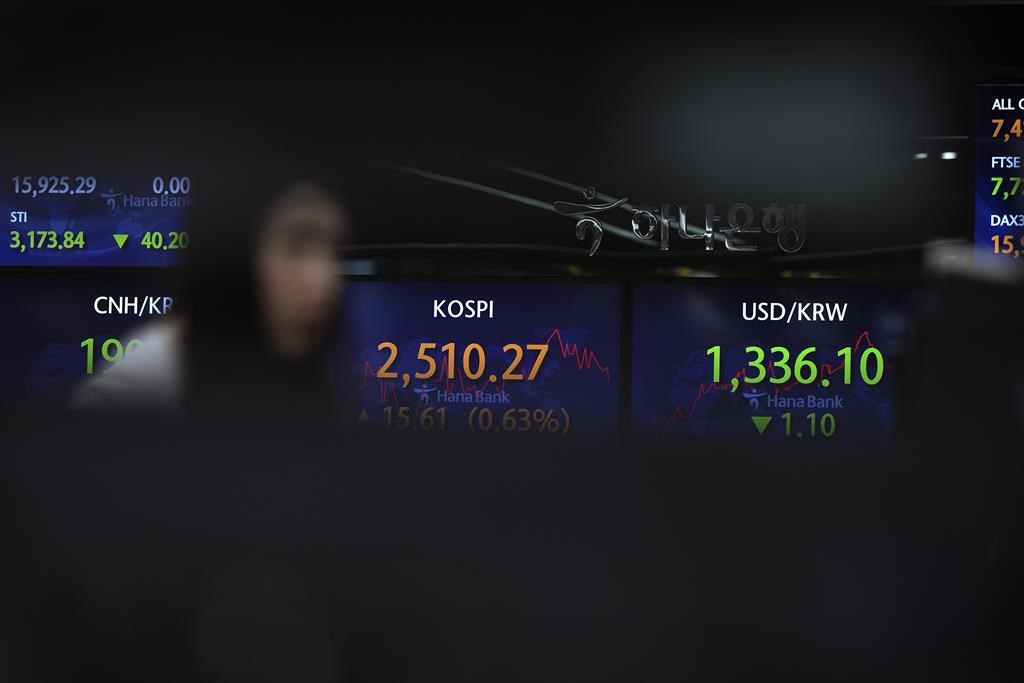TORONTO — Canada’s main stock index effectively broke even Thursday after paring back losses over the afternoon, while U.S. stock markets rose, with the Nasdaq leading the way.
While markets were wary Thursday, there’s a bigger trend going on that’s seeing big tech companies leading gains so far this year in a “top-heavy rally,” said Pierre-Benoît Gauthier, assistant vice-president of investment strategy at IG Wealth Management.
“It’s only a handful of stocks that are propping up the whole index,” he said.
The S&P/TSX composite index closed up 0.66 points at 20,297.09.
In New York, the Dow Jones industrial average was up 115.15 points at 33,535.91. The S&P 500 index was up 39.28 points at 4,198.05, while the Nasdaq composite was up 188.27 points at 12,688.84.
The Nasdaq has outperformed other indexes so far this year, said Gauthier. After taking a hit last year, “now it’s back in full force,” he said.
Gauthier thinks this is in part due to interest in artificial intelligence, but there’s also been a shift in how investors view these companies, he said.
“Big tech is seen as a safe haven from all the problems that we’re seeing everywhere,” said Gauthier.
Talks continue over the U.S. debt limit in efforts to strike a deal and avert a situation where the country runs out of funds to pay its obligations, which would spark an economic crisis. House Speaker Kevin McCarthy said it was important to have an “agreement in principle” on the debt ceiling this weekend.
While the debt ceiling talks have been weighing somewhat on sentiment, Gauthier said “in the long run, everybody knows they’re going to reach a deal at some point.”
Meanwhile, new data on jobless claims in the U.S. saw the labour market remain strong, though economists expect jobless claims to slowly increase as the year progresses.
Yet another positive print on the labour market is a “double-edged sword,” said Gauthier. On the one hand, the strength in the labour market supports the idea of a soft landing, but it also provides more incentive for another rate hike, he said.
Friday will see fresh retail sales data for Canada released, noted Gauthier, which will provide insight on how the consumer is faring. The Canadian consumer is more sensitive to interest rate hikes than the U.S. consumer, he said.
The Bank of Canada said in its annual financial system review Thursday that it was more concerned than a year ago about the ability of Canadian households to manage their debt amid a transition to higher interest rates for the longer term.
“Nobody should expect that interest rates are going to go back down to the very low levels that we’ve seen over the last decade or so,” Macklem told a news conference discussing the review.
“We’re in a transition period to a world where interest rates are going to be higher than what many people have gotten used to and that transition is going to take a while. And through that transition that creates some risks.”
The Canadian dollar traded for 74.07 cents UScompared with 74.28 cents US on Wednesday.
The July crude contract was down 95 cents at US$71.94 per barrel and the June natural gas contract was up 23 cents at US$2.59 per mmBTU.
The June gold contract was down US$25.10 at US$1,959.80 an ounce and the July copper contract was down seven cents at US$3.69 a pound.
— With files from The Associated Press
This report by The Canadian Press was first published May 18, 2023.
Companies in this story: (TSX:GSPTSE, TSX_CADUSD=X)



